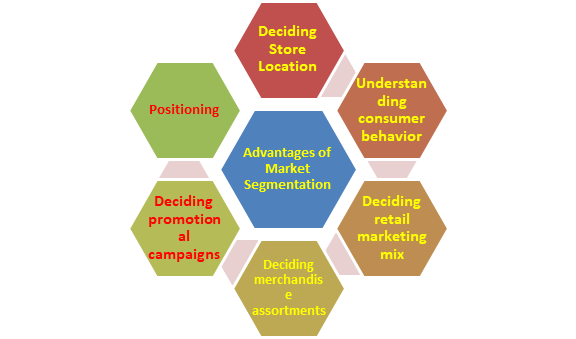Retail Marketing deals with identifying and meeting human and social needs. Retail marketing is typically seen as the task of creating promotion and delivering goods and services to retail consumers. The marketer has two options to satisfy the consumers’ needs first he should approach to all customers with identical marketing approach or adopt a differentiated approach for different sets of customers. The first approach in the world of retailing is known as mass marketing, the latter is turned as market segmentation. This chapter is an attempt to discuss the concept of market segmentation and highlights the criteria for market segmentation to gain competitive advantage.
Concept of Market Segmentation
Market segmentation is the process breaking down an entire heterogeneous market into small markets or segments of customers that are identical in terms of some characteristics like needs wants and buying behavior. Retail markets like any other sort of business, may enjoy the benefits of segmenting the markets. Due to increased competition, mass marketing approach is not feasible all the time.
Consumers have various retail formats to shop and distance is not an obstacle these days. A consumer can buy any consumer electronic item form a nearby shop or from a super bazaar; he may also visit to electronic Gallery to buy the same. Therefore, in order to attract customers and sustain them requires market segmentation where a retailer divides his customers into smaller groups and approaches them with different set of promotional programmes.
In evaluating different market segments, retailer considers two factors:
(i) The segment’s overall attractiveness
(ii) The firm’ objectives and overall resources.
It helps a retailer to customize the goods & services vis a vis its promotional campaigns according to the needs of narrowly defined customer group.
Significance of Market Segmentation
Retailers segment the market to identify particular groups of Customers in their trading areas so that selling and promotional efforts may be concentrated. The purpose of such exercise is to make the retailer the most attractive destination. Segmenting a market has following advantages:

-
Deciding Store Location
Market segmentation helps a retailer in deciding locations for its new outlets in case of expansion. The retail stores may be set up as per the concentration of target population. A location which is attractive and has good traffic flow but serves no target market is of new use to a retailer.
-
Understanding consumer behavior
Market segmentation helps a retailer to understand why consumers behave differently in a same set of marketing and promotional efforts. Once a heterogeneous market is divided into few homogeneous groups, it becomes easy for a retailer to develop an effective marketing & promotional strategy.
-
Deciding retail marketing mix
Marketing segmentation helps a retailers in deciding 7ps (Product, Price, Place, promotion, People, Procedure and presentation) depending upon the target market to serviced.
-
Deciding merchandise assortments
A retailer is always bothered about which item of inventory should be bought and displayed on the store’s shelves. Once the market is segmented, retailer can decide which item will go on the shelves. For a merchandise decision to be made successful, a perfect understanding of particular target market is essential.
-
Deciding promotional campaigns
Segmentation helps a retailer in deciding and developing accurate promotional campaigns that hit target at right time and at right place.
-
Positioning
Segmentation helps a retailer in positioning itself in a particular target market. For Instance, Ebony and Shopper’s stop have positioned themselves for higher income level while Vishal Mega Mart and Big Bazaar have targeted the Indian middle class.
Strategies for Effective Market Segmentation
For effective market segmentation, the following two strategies are used by the marketing force of the organization:
-
Concentration (Niche) Strategy
Under this strategy, an organization focuses going after large share of only one or very few segment(s). This strategy provides a differential advantage over competing organizations which are not solely concentrating on one segment.
For example, Toyota employs this strategy by offering various models under hybrid vehicles market.
-
Multi-segment Strategy
Under this strategy, an organization focuses its marketing efforts on two or more distinct market segments.
For example, Johnson and Johnson offers healthcare products in the range of baby care, skin care, nutritionals, and vision care products segmented for the customers of all ages.